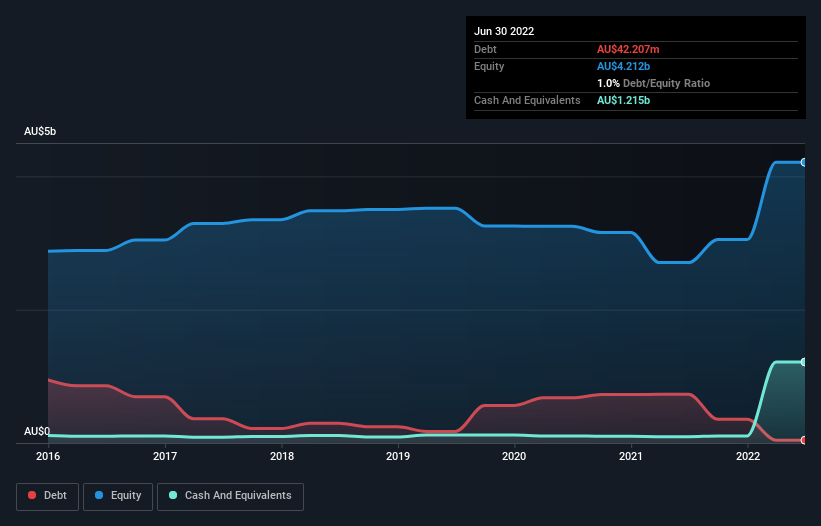The external fund manager backed by Berkshire Hathaway's Charlie Munger, Li Lu, makes no bones about it when he says 'The biggest investment risk is not the volatility of prices, but whether you will suffer a permanent loss of capital.' It's only natural to consider a company's balance sheet when you examine how risky it is, since debt is often involved when a business collapses. We note that Whitehaven Coal Limited (ASX:WHC) does have debt on its balance sheet. But is this debt a concern to shareholders?
When Is Debt A Problem?
Debt assists a business until the business has trouble paying it off, either with new capital or with free cash flow. Part and parcel of capitalism is the process of 'creative destruction' where failed businesses are mercilessly liquidated by their bankers. However, a more usual (but still expensive) situation is where a company must dilute shareholders at a cheap share price simply to get debt under control. Having said that, the most common situation is where a company manages its debt reasonably well - and to its own advantage. When we think about a company's use of debt, we first look at cash and debt together.
Check out our latest analysis for Whitehaven Coal
How Much Debt Does Whitehaven Coal Carry?
The image below, which you can click on for greater detail, shows that Whitehaven Coal had debt of AU$42.2m at the end of June 2022, a reduction from AU$729.8m over a year. However, its balance sheet shows it holds AU$1.22b in cash, so it actually has AU$1.17b net cash.

How Strong Is Whitehaven Coal's Balance Sheet?
We can see from the most recent balance sheet that Whitehaven Coal had liabilities of AU$1.05b falling due within a year, and liabilities of AU$863.1m due beyond that. On the other hand, it had cash of AU$1.22b and AU$657.5m worth of receivables due within a year. So its liabilities outweigh the sum of its cash and (near-term) receivables by AU$40.0m.
This state of affairs indicates that Whitehaven Coal's balance sheet looks quite solid, as its total liabilities are just about equal to its liquid assets. So it's very unlikely that the AU$9.40b company is short on cash, but still worth keeping an eye on the balance sheet. Despite its noteworthy liabilities, Whitehaven Coal boasts net cash, so it's fair to say it does not have a heavy debt load!
Although Whitehaven Coal made a loss at the EBIT level, last year, it was also good to see that it generated AU$2.8b in EBIT over the last twelve months. The balance sheet is clearly the area to focus on when you are analysing debt. But it is future earnings, more than anything, that will determine Whitehaven Coal's ability to maintain a healthy balance sheet going forward. So if you want to see what the professionals think, you might find this free report on analyst profit forecasts to be interesting.
Finally, a business needs free cash flow to pay off debt; accounting profits just don't cut it. While Whitehaven Coal has net cash on its balance sheet, it's still worth taking a look at its ability to convert earnings before interest and tax (EBIT) to free cash flow, to help us understand how quickly it is building (or eroding) that cash balance. During the last year, Whitehaven Coal generated free cash flow amounting to a very robust 84% of its EBIT, more than we'd expect. That positions it well to pay down debt if desirable to do so.
Summing Up
We could understand if investors are concerned about Whitehaven Coal's liabilities, but we can be reassured by the fact it has has net cash of AU$1.17b. And it impressed us with free cash flow of AU$2.4b, being 84% of its EBIT. So we don't think Whitehaven Coal's use of debt is risky. When analysing debt levels, the balance sheet is the obvious place to start. But ultimately, every company can contain risks that exist outside of the balance sheet. Be aware that Whitehaven Coal is showing 3 warning signs in our investment analysis , and 1 of those can't be ignored...
If you're interested in investing in businesses that can grow profits without the burden of debt, then check out this free list of growing businesses that have net cash on the balance sheet.
Valuation is complex, but we're here to simplify it.
Discover if Whitehaven Coal might be undervalued or overvalued with our detailed analysis, featuring fair value estimates, potential risks, dividends, insider trades, and its financial condition.
Access Free AnalysisHave feedback on this article? Concerned about the content? Get in touch with us directly. Alternatively, email editorial-team (at) simplywallst.com.
This article by Simply Wall St is general in nature. We provide commentary based on historical data and analyst forecasts only using an unbiased methodology and our articles are not intended to be financial advice. It does not constitute a recommendation to buy or sell any stock, and does not take account of your objectives, or your financial situation. We aim to bring you long-term focused analysis driven by fundamental data. Note that our analysis may not factor in the latest price-sensitive company announcements or qualitative material. Simply Wall St has no position in any stocks mentioned.
About ASX:WHC
Whitehaven Coal
Develops and operates coal mines in Queensland and New South Wales.
Good value with proven track record.
Similar Companies
Market Insights
Community Narratives



